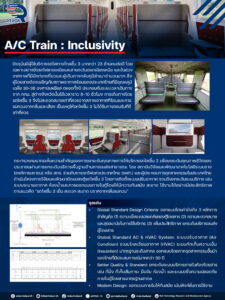RTRDA and Huawei Sign MOU to Drive Manpower Development and Technology Transfer in Thailand's Rail Industry with a Focus on Information and Communication Technology (ICT)
On July 5, 2023, Mr. Chayathan Phromsorn, Permanent Secretary of the Ministry of Transport, presided over and witnessed the signing ceremony of a Memorandum of Understanding (MOU) between the Rail Technology Research and Development Agency (Public Organisation) or “RTRDA” and Huawei Technologies (Thailand) Company Limited.
The MOU aims to drive manpower development and facilitate technology transfer in information and communication technology for Thailand's rapidly evolving rail industry. The signing ceremony took place at G Tower, the Headquarters of Huawei Technologies (Thailand) Company Limited, in Bangkok. Mr. Santi Charoenpornpattana, President of the RTRDA, and Mr. Kevin Cheng, President of Thailand Enterprise Business Group, Huawei Technologies (Thailand) Co., Ltd., were present to sign the memorandum of cooperation. Additionally, Mr. Chotchai Charoenngam, Chairman of the Board of Directors of the RTRDA, and Mr. Edison Xu, Board Director of Huawei Technologies (Thailand) Co., Ltd., served as witnesses to the signing.


Technologies (Thailand) Co., Ltd., were present to sign the memorandum of cooperation. Additionally, Mr. Chotchai Charoenngam, Chairman of the Board of Directors of the RTRDA, and Mr. Edison Xu, Board Director of Huawei Technologies (Thailand) Co., Ltd., served as witnesses to the signing. Highlighting the importance of Thailand's ongoing rail transport infrastructure development, Mr. Chayathan Phromsorn, Permanent Secretary of the Ministry of Transport, emphasised critical initiatives such as the expansion of the dual-track railway network, establishment of a high-speed train network, and enhancement of equipment systems and rail transport infrastructure. These strategic endeavours serve as the foundation for the country's future economic, social, and environmental progress. To cultivate a robust rail industry ecosystem, it is imperative to concurrently pursue technology development strategies, rail standardisation and testing system development, rail technology research and development, and the cultivation of a highly-skilled workforce to meet the growing demand of the rail sector. In line with this vision, the Ministry of Transport established RTRDA to serve as a core mechanism for integrating expertise and resources from diverse stakeholders in the rail ecosystem, thereby strengthening rail research and development, and fostering the growth of Thailand's rail industry. With the core focus on R&D, innovation, and manpower development, RTRDA also functions as an excellence centre for exchanging and transferring rail technology at both national and international levels.
Huawei, recognised globally as a leader in the information and communication technology sector, has deeply committed to Thailand’s rail industry development through training, professional development, and technology development, leveraging its extensive knowledge, experience, and infrastructure. Huawei, therefore, holds remarkable potential to support our country’s rail industry. With a focus on ICT, RTRDA and Huawei will jointly organize targeted training courses to enhance the expertise of rail workers through Reskill Training. These courses will empower employees to adapt to the latest technological trends and ensure the seamless integration of digital solutions within the rail system. Moreover, Advanced Technical Training will be offered to aspiring professionals looking to build careers in the rail sector. This advanced training will nurture a new generation of experts well-versed in state-of-the-art ICT applications, preparing them to lead the rail industry’s future. In addition to skill development, this partnership will foster technology transfer initiatives in automation and robotics. The integration of these cutting-edge technologies into rail infrastructure and transportation management will drive efficiency and elevate the industry's performance.


The collaboration between RTRDA and Huawei is a significant step towards realizing Thailand's 20-year strategic plan for transportation system development (2018-2037). By harnessing the potential of ICT and fostering a skilled workforce, the rail industry will propel itself into a technologically advanced era, benefitting both passengers and Thailand's economy.


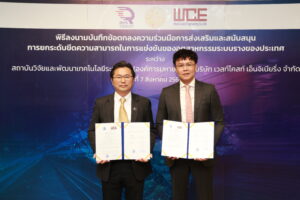
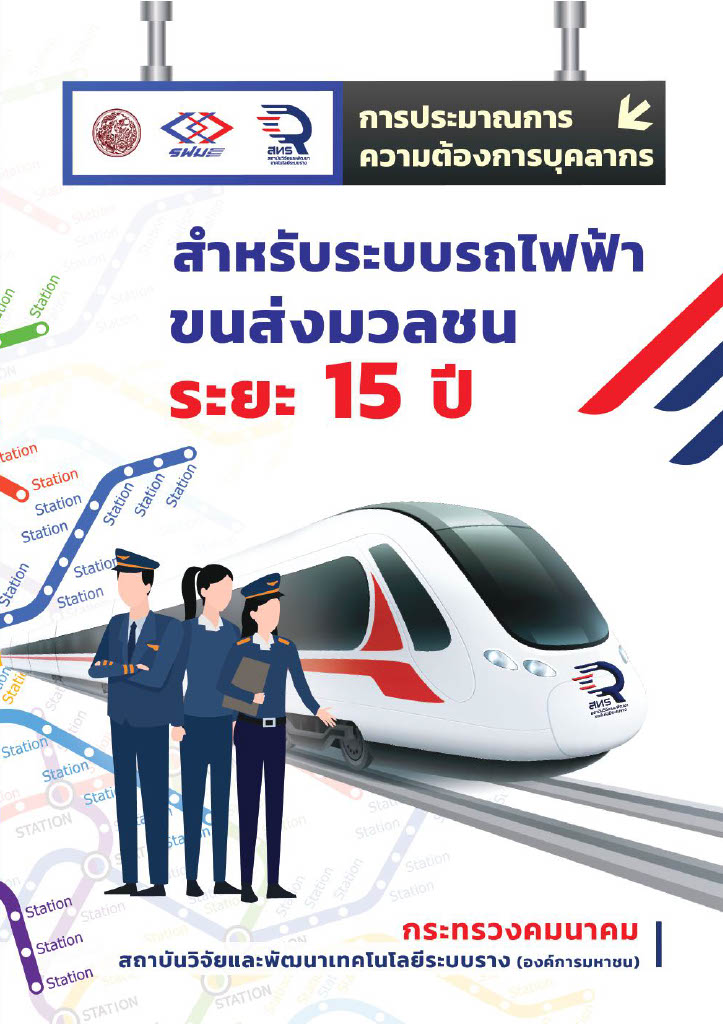 การประมาณการความต้องการบุคลากรสำหรับระบบรถไฟฟ้าขนส่งมวลชนระยะ 15 ปี ประเทศไทยได้กำหนดนโยบายการพัฒนาขีดความสามารถในการแข่งขันของประเทศ ซึ่งมีโครงสร้างพื้นฐานด้านคมนาคมและระบบโลจิสติกส์เป็นส่วนหนึ่งของฐานในการขับเคลื่อนการพัฒนา โดยเฉพาะระบบการขนส่งทางรางทั้งในด้านการขนส่งสินค้าและการขนส่งผู้โดยสาร และได้นำไปสู่การวางแผนขยายเส้นทางของระบบรางของประเทศ ทั้งในระบบการขนส่งทางไกล ซึ่งเป็นระบบโครงข่ายที่กระจายอยู่ทั่วประเทศ และระบบขนส่งรถไฟฟ้าในเมืองและรถไฟฟ้าระหว่างเมือง โดยเฉพาะอย่างยิ่งระบบไฟฟ้าขนส่งมวลชนในเมือง เนื่องด้วยประเทศไทยกำลังดำเนินการพัฒนาระบบขนส่งมวลชนทางรางประเภทรถไฟฟ้า และในบางเส้นทางนั้นมีแนวโน้มที่กำลังจะเปิดให้บริการในระยะเวลาอันใกล้สทร. ในฐานะหน่วยงานที่มีพันธกิจตามกฎหมายในการดำเนินการส่งเสริมและสนับสนุนการพัฒนาบุคลากรระบบรางของประเทศ จึงได้ดำเนินการศึกษาและพัฒนาการประมาณการความต้องการบุคลากรสำหรับระบบรถไฟฟ้าขนส่งมวลชน ระยะ 15 ปี เพื่อส่งเสริมการผลิตและพัฒนาบุคลากรระบบรางในประเทศ รวมถึงเพื่อเป็นกรอบแนวทางในการขับเคลื่อนการผลิตและพัฒนาบุคลากรระบบรางให้กับภาคผู้กำหนดนโยบาย ภาคผู้เดินรถ/ผู้ประกอบการ และภาคการศึกษาและฝึกอบรม รวมถึงประชาชนทั่วไปที่สนใจด้วย จากการศึกษาและรวบรวมข้อมูลแนวปฏิบัติทั้งในประเทศ และต่างประเทศ พบว่า กลุ่มงานและตำแหน่งงานที่เป็นส่วนหลักพื้นฐานในการบริหารจัดการเดินรถหนึ่งเส้นทางที่สำคัญ คือ ฝ่ายงานบริหารจัดการเดินรถ ซึ่งเป็นกลุ่มงานที่ต้องมีความรู้และประสบการณ์ด้านความปลอดภัยและด้านเทคนิค เพื่อให้สามารถบริการได้อย่างมีมาตรฐาน สะดวกสบาย ตรงต่อเวลา และปลอดภัยแก่ผู้รับบริการ รายงานการศึกษานี้ จึงมุ่งเน้นศึกษาและประมาณการความต้องการบุคลากรในฝ่ายงานบริหารจัดการเดินรถเป็นสำคัญ ซึ่งประกอบด้วย 3 กลุ่มงานหลัก ได้แก่
การประมาณการความต้องการบุคลากรสำหรับระบบรถไฟฟ้าขนส่งมวลชนระยะ 15 ปี ประเทศไทยได้กำหนดนโยบายการพัฒนาขีดความสามารถในการแข่งขันของประเทศ ซึ่งมีโครงสร้างพื้นฐานด้านคมนาคมและระบบโลจิสติกส์เป็นส่วนหนึ่งของฐานในการขับเคลื่อนการพัฒนา โดยเฉพาะระบบการขนส่งทางรางทั้งในด้านการขนส่งสินค้าและการขนส่งผู้โดยสาร และได้นำไปสู่การวางแผนขยายเส้นทางของระบบรางของประเทศ ทั้งในระบบการขนส่งทางไกล ซึ่งเป็นระบบโครงข่ายที่กระจายอยู่ทั่วประเทศ และระบบขนส่งรถไฟฟ้าในเมืองและรถไฟฟ้าระหว่างเมือง โดยเฉพาะอย่างยิ่งระบบไฟฟ้าขนส่งมวลชนในเมือง เนื่องด้วยประเทศไทยกำลังดำเนินการพัฒนาระบบขนส่งมวลชนทางรางประเภทรถไฟฟ้า และในบางเส้นทางนั้นมีแนวโน้มที่กำลังจะเปิดให้บริการในระยะเวลาอันใกล้สทร. ในฐานะหน่วยงานที่มีพันธกิจตามกฎหมายในการดำเนินการส่งเสริมและสนับสนุนการพัฒนาบุคลากรระบบรางของประเทศ จึงได้ดำเนินการศึกษาและพัฒนาการประมาณการความต้องการบุคลากรสำหรับระบบรถไฟฟ้าขนส่งมวลชน ระยะ 15 ปี เพื่อส่งเสริมการผลิตและพัฒนาบุคลากรระบบรางในประเทศ รวมถึงเพื่อเป็นกรอบแนวทางในการขับเคลื่อนการผลิตและพัฒนาบุคลากรระบบรางให้กับภาคผู้กำหนดนโยบาย ภาคผู้เดินรถ/ผู้ประกอบการ และภาคการศึกษาและฝึกอบรม รวมถึงประชาชนทั่วไปที่สนใจด้วย จากการศึกษาและรวบรวมข้อมูลแนวปฏิบัติทั้งในประเทศ และต่างประเทศ พบว่า กลุ่มงานและตำแหน่งงานที่เป็นส่วนหลักพื้นฐานในการบริหารจัดการเดินรถหนึ่งเส้นทางที่สำคัญ คือ ฝ่ายงานบริหารจัดการเดินรถ ซึ่งเป็นกลุ่มงานที่ต้องมีความรู้และประสบการณ์ด้านความปลอดภัยและด้านเทคนิค เพื่อให้สามารถบริการได้อย่างมีมาตรฐาน สะดวกสบาย ตรงต่อเวลา และปลอดภัยแก่ผู้รับบริการ รายงานการศึกษานี้ จึงมุ่งเน้นศึกษาและประมาณการความต้องการบุคลากรในฝ่ายงานบริหารจัดการเดินรถเป็นสำคัญ ซึ่งประกอบด้วย 3 กลุ่มงานหลัก ได้แก่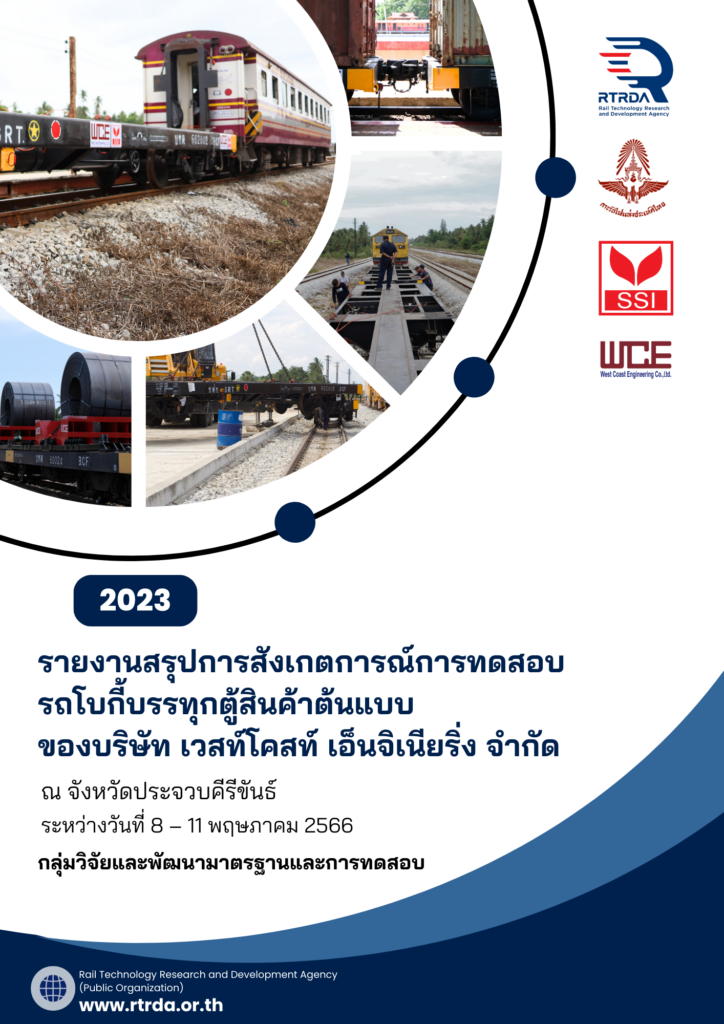 ด้วยกลุ่มงานวิจัยและพัฒนามาตรฐานและการทดสอบ สถาบันวิจัยและพัฒนาเทคโนโลยีระบบราง (องค์การมหาชน) (สทร..) มีพันธกิจในการพัฒนามาตรฐานระบบการทดสอบและดำเนินการทดสอบด้านระบบราง ซึ่งทาง บริษัท เวสท์โคสท์ เอ็นจิเนียริ่ง จำกัด (WCE) บริษัทในเครือสหวิริยาสตีลอินดัสตรี จำกัด (SSI) ได้เป็นพันธมิตรและทำบันทึกตกลงความร่วมมือ (MOU) ระหว่าง สทร. กับ WCE เรื่อง การส่งเสริมสนับสนุนการยกระดับขีดความสามารถในการแข่งขันของอุตสาหกรรมระบบรางของประเทศ” โดยทาง WCE ได้เชิญให้ สทร. เข้าร่วมสังเกตการณ์การทดสอบ Static Test และ Running Test ของรถโบกี้บรรทุกตู้สินค้า (บทต ตามมาตรฐานวิธีการทดสอบการรถไฟแห่งประเทศไทย โดยดำเนินการระหว่างวันที่ 8 11 พฤษภาคม 2566 ณ บริษัท เวสโคสท์ เอ็นจิเนียริ่ง จำกัด และสถานีรถไฟนาผักขวง จังหวัดประจวบคีรีขันธ์
ด้วยกลุ่มงานวิจัยและพัฒนามาตรฐานและการทดสอบ สถาบันวิจัยและพัฒนาเทคโนโลยีระบบราง (องค์การมหาชน) (สทร..) มีพันธกิจในการพัฒนามาตรฐานระบบการทดสอบและดำเนินการทดสอบด้านระบบราง ซึ่งทาง บริษัท เวสท์โคสท์ เอ็นจิเนียริ่ง จำกัด (WCE) บริษัทในเครือสหวิริยาสตีลอินดัสตรี จำกัด (SSI) ได้เป็นพันธมิตรและทำบันทึกตกลงความร่วมมือ (MOU) ระหว่าง สทร. กับ WCE เรื่อง การส่งเสริมสนับสนุนการยกระดับขีดความสามารถในการแข่งขันของอุตสาหกรรมระบบรางของประเทศ” โดยทาง WCE ได้เชิญให้ สทร. เข้าร่วมสังเกตการณ์การทดสอบ Static Test และ Running Test ของรถโบกี้บรรทุกตู้สินค้า (บทต ตามมาตรฐานวิธีการทดสอบการรถไฟแห่งประเทศไทย โดยดำเนินการระหว่างวันที่ 8 11 พฤษภาคม 2566 ณ บริษัท เวสโคสท์ เอ็นจิเนียริ่ง จำกัด และสถานีรถไฟนาผักขวง จังหวัดประจวบคีรีขันธ์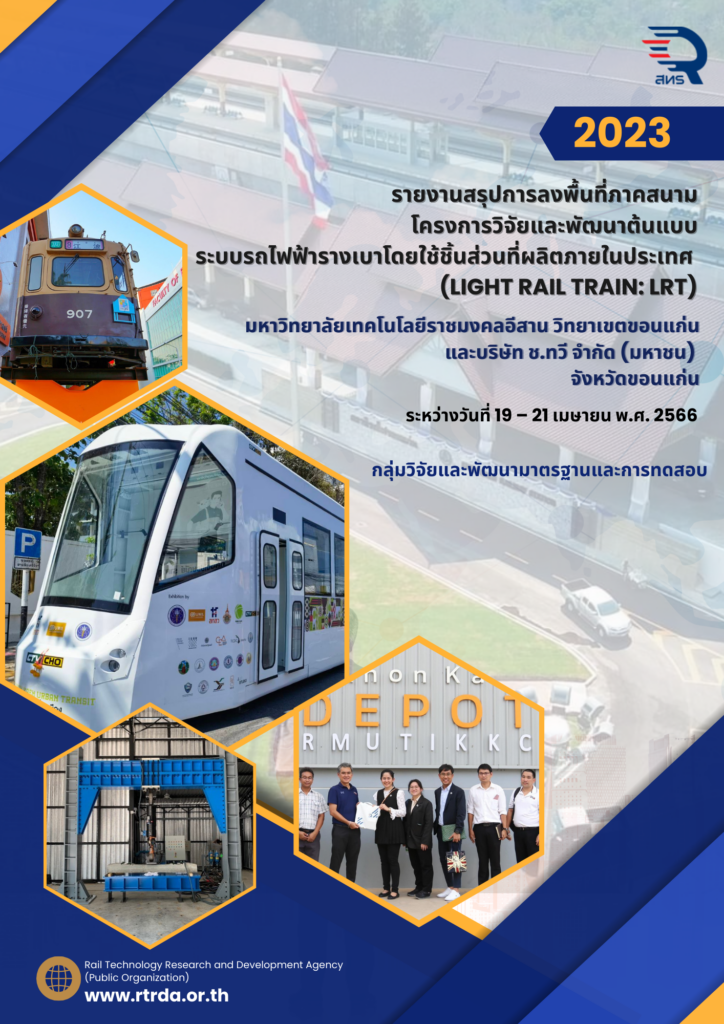 เอกสารฉบับนี้ จัดทาขึ้น เพื่อศึกษาแนวทางการผลักดันและส่งเสริมการผลิตชิ้นส่วนอะไหล่และผลิตภัณฑ์ด้านอุตสาหกรรมการขนส่งทางรางให้เกิดขึ้นในประเทศ ตามการพัฒนาห่วงโซ่อุปทาน (Supply Chain) เพื่อให้เกิด Local Content ที่ยั่งยืน สอดคล้องกับแผนยุทธศาสตร์ชาติ 20 ปี ควบคู่กับแผนยุทธศาสตร์คมนาคม ซึ่งทาง สทร. ได้เล็งเห็นความสาคัญการสนับสนุนการสร้างอุตสาหกรรมการผลิตชิ้นส่วนระบบรางในประเทศ เพื่อสนับสนุนนโยบาย Thai First ผ่านแผนงานบูรณาการความร่วมมือ เพื่อยกระดับคุณภาพบริการและการผลิตให้เทียบเท่ามาตรฐานสากล
เอกสารฉบับนี้ จัดทาขึ้น เพื่อศึกษาแนวทางการผลักดันและส่งเสริมการผลิตชิ้นส่วนอะไหล่และผลิตภัณฑ์ด้านอุตสาหกรรมการขนส่งทางรางให้เกิดขึ้นในประเทศ ตามการพัฒนาห่วงโซ่อุปทาน (Supply Chain) เพื่อให้เกิด Local Content ที่ยั่งยืน สอดคล้องกับแผนยุทธศาสตร์ชาติ 20 ปี ควบคู่กับแผนยุทธศาสตร์คมนาคม ซึ่งทาง สทร. ได้เล็งเห็นความสาคัญการสนับสนุนการสร้างอุตสาหกรรมการผลิตชิ้นส่วนระบบรางในประเทศ เพื่อสนับสนุนนโยบาย Thai First ผ่านแผนงานบูรณาการความร่วมมือ เพื่อยกระดับคุณภาพบริการและการผลิตให้เทียบเท่ามาตรฐานสากล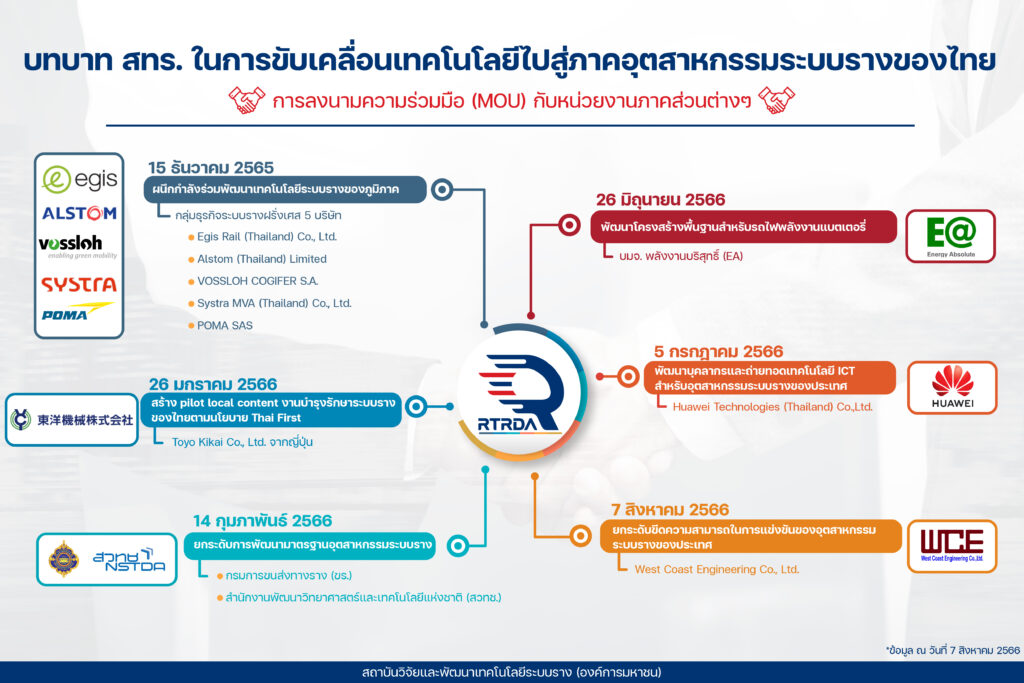
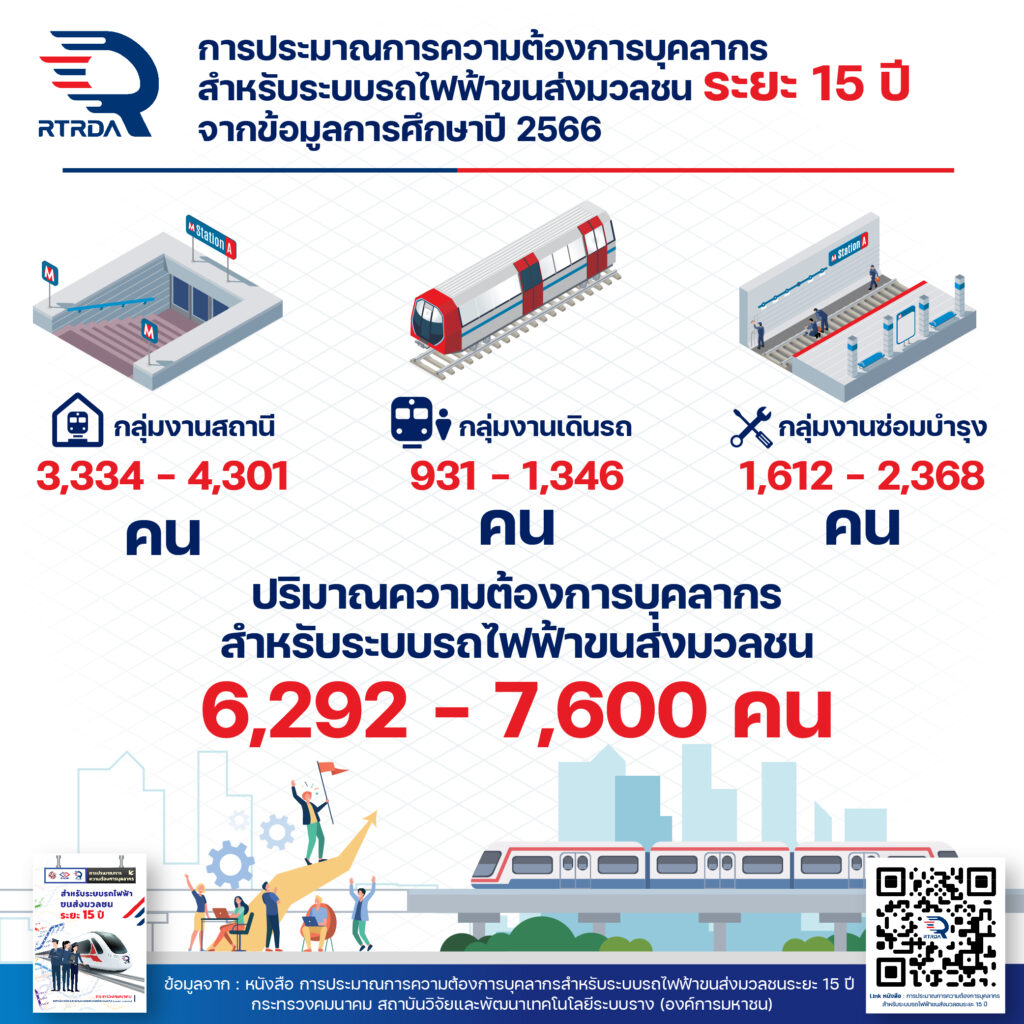
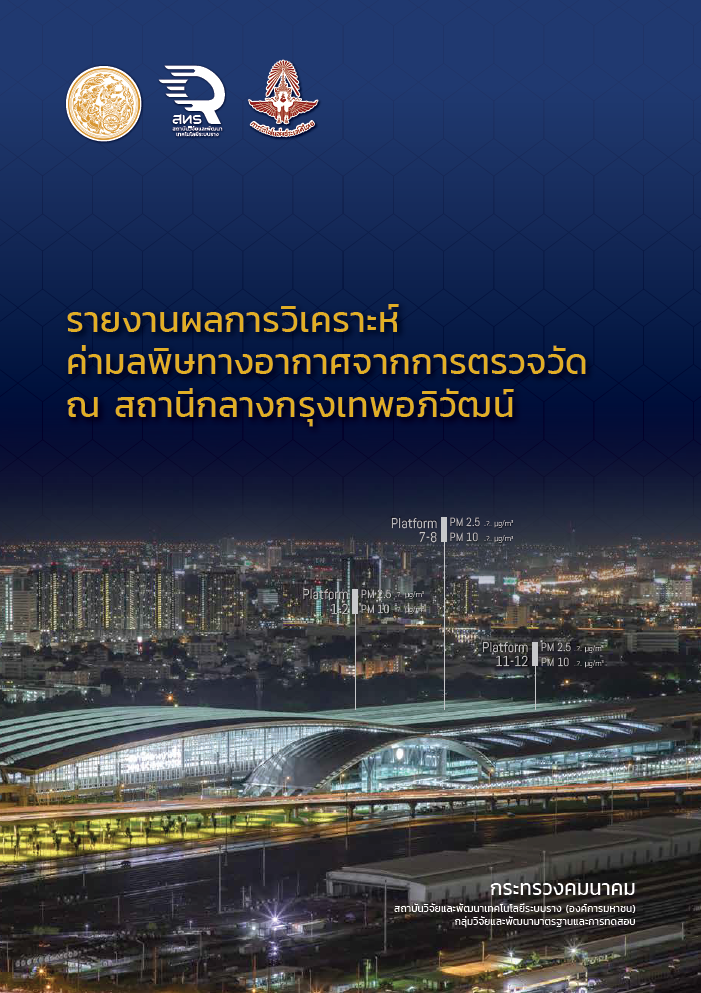 สถาบันวิจัยและพัฒนาเทคโนโลยีระบบราง (องค์การมหาชน) เล็งเห็นถึงความจำเป็นเร่งด่วน โดยได้ดำเนินการลงพื้นที่เพื่อทำการตรวจวัดค่ามลพิษทางอากาศ ณ บริเวณ ชานชาลา สถานีกลางกรุงเทพอภิวัฒน์ โดยใช้เทคนิควิธีการวัดและเครื่องมือที่ได้มาตรฐานสากล และมีระบบ คุณภาพเป็นไปตามมาตรฐาน ISO/IEC 17025 แต่อย่างไรก็ดี ผลการตรวจวัดดังกล่าว ไม่สามารถแปรผลและ ใช้งานได้ทันที จำเป็นต้องถูกวิเคราะห์อย่างละเอียด เพื่อให้สามารถแก้ปัญหาได้อย่างถูกต้องตรงประเด็น อัน จะช่วยให้การกำหนดแนวทางแก้ไขปัญหาสามารถดำเนินการได้อย่างเป็นรูปธรรม อีกทั้งยังช่วยลดค่าใช้จ่ายใน ดำเนินการปรับปรุง และป้องกันปัญหาดังกล่าวด้วย
สถาบันวิจัยและพัฒนาเทคโนโลยีระบบราง (องค์การมหาชน) เล็งเห็นถึงความจำเป็นเร่งด่วน โดยได้ดำเนินการลงพื้นที่เพื่อทำการตรวจวัดค่ามลพิษทางอากาศ ณ บริเวณ ชานชาลา สถานีกลางกรุงเทพอภิวัฒน์ โดยใช้เทคนิควิธีการวัดและเครื่องมือที่ได้มาตรฐานสากล และมีระบบ คุณภาพเป็นไปตามมาตรฐาน ISO/IEC 17025 แต่อย่างไรก็ดี ผลการตรวจวัดดังกล่าว ไม่สามารถแปรผลและ ใช้งานได้ทันที จำเป็นต้องถูกวิเคราะห์อย่างละเอียด เพื่อให้สามารถแก้ปัญหาได้อย่างถูกต้องตรงประเด็น อัน จะช่วยให้การกำหนดแนวทางแก้ไขปัญหาสามารถดำเนินการได้อย่างเป็นรูปธรรม อีกทั้งยังช่วยลดค่าใช้จ่ายใน ดำเนินการปรับปรุง และป้องกันปัญหาดังกล่าวด้วย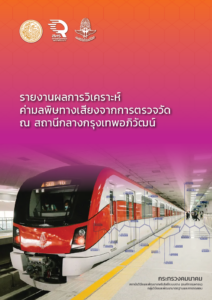 ทางสถาบันวิจัยและพัฒนาเทคโนโลยีระบบราง (องค์การมหาชน) เล็งเห็นถึงความจําเป็นเรื่องด่วนในการแก้ไขปัญหาที่เกิดขึ้น จึงได้เรื่องดําเนินการลงพื้นที่เพ่ือทําการตรวจวัดค่า มลพิษทางด้านเสียงรบกวน ณ บริเวณชานชาลา สถานีกลางกรุงเทพอภิวัฒน์ โดยใช้เทคนิควิธีการวัดและ เครื่องมือที่ได้มาตรฐานสากล และมีระบบคุณภาพเป็นไปตามมาตรฐาน ISO/IEC 17025 แต่อย่างไรก็ดี ผลการตรวจวัดดังกล่าว ไม่สามารถแปรผลและใช้งานได้ทันที จําเป็นต้องถูกวิเคราะห์อย่างละเอียด เพื่อให้ สามารถแก้ปัญหาได้อย่างถูกต้องตรงประเด็น อันจะช่วยให้การกําหนดแนวทางแก้ไขปัญหาสามารถดําเนินการ ได้อย่างเป็นรูปธรรม อีกทั้งยังช่วยลดค่าใช้จ่ายในดําเนินการปรับปรุง และป้องกันปัญหาดังกล่าวด้วย
ทางสถาบันวิจัยและพัฒนาเทคโนโลยีระบบราง (องค์การมหาชน) เล็งเห็นถึงความจําเป็นเรื่องด่วนในการแก้ไขปัญหาที่เกิดขึ้น จึงได้เรื่องดําเนินการลงพื้นที่เพ่ือทําการตรวจวัดค่า มลพิษทางด้านเสียงรบกวน ณ บริเวณชานชาลา สถานีกลางกรุงเทพอภิวัฒน์ โดยใช้เทคนิควิธีการวัดและ เครื่องมือที่ได้มาตรฐานสากล และมีระบบคุณภาพเป็นไปตามมาตรฐาน ISO/IEC 17025 แต่อย่างไรก็ดี ผลการตรวจวัดดังกล่าว ไม่สามารถแปรผลและใช้งานได้ทันที จําเป็นต้องถูกวิเคราะห์อย่างละเอียด เพื่อให้ สามารถแก้ปัญหาได้อย่างถูกต้องตรงประเด็น อันจะช่วยให้การกําหนดแนวทางแก้ไขปัญหาสามารถดําเนินการ ได้อย่างเป็นรูปธรรม อีกทั้งยังช่วยลดค่าใช้จ่ายในดําเนินการปรับปรุง และป้องกันปัญหาดังกล่าวด้วย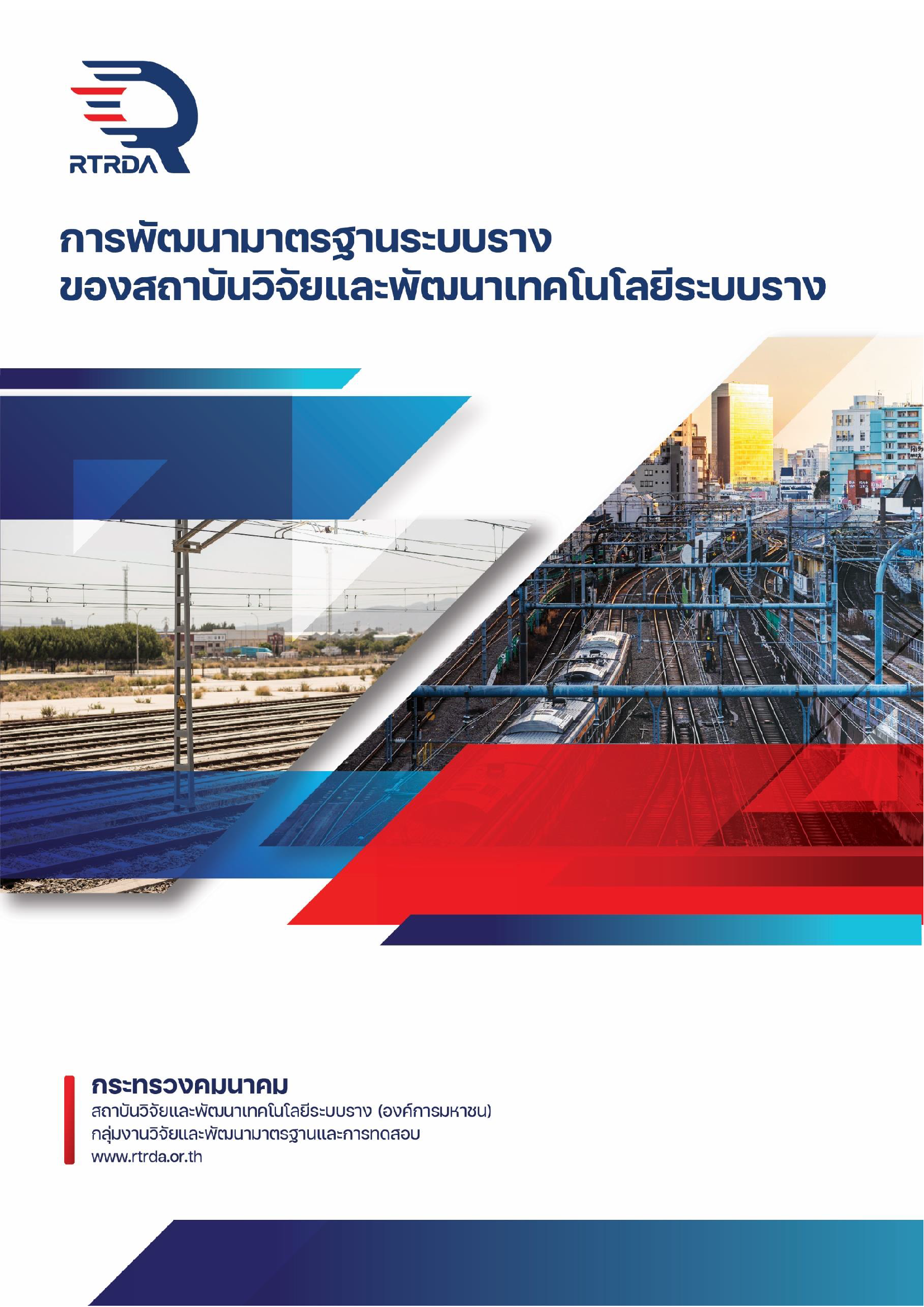 การดำเนินโครงการขนส่งทางรางด้านต่างๆ ไม่ว่าด้านออกแบบ การกำหนดคุณลักษณะเฉพาะของชิ้นส่วนอุปกรณ์ การติดตั้ง การทดสอบ การซ่อมบำรุง และการเดินรถ จำเป็นต้องปฏิบัติหรืออ้างอิงให้เป็นไปตามมาตรฐานระบบรางที่เป็นสากลหรือเป็นที่ยอมรับ แต่ปัจจุบัน พบว่า การกำหนดมาตรฐานระบบรางในประเทศไทยยังมีข้อจำกัด
การดำเนินโครงการขนส่งทางรางด้านต่างๆ ไม่ว่าด้านออกแบบ การกำหนดคุณลักษณะเฉพาะของชิ้นส่วนอุปกรณ์ การติดตั้ง การทดสอบ การซ่อมบำรุง และการเดินรถ จำเป็นต้องปฏิบัติหรืออ้างอิงให้เป็นไปตามมาตรฐานระบบรางที่เป็นสากลหรือเป็นที่ยอมรับ แต่ปัจจุบัน พบว่า การกำหนดมาตรฐานระบบรางในประเทศไทยยังมีข้อจำกัด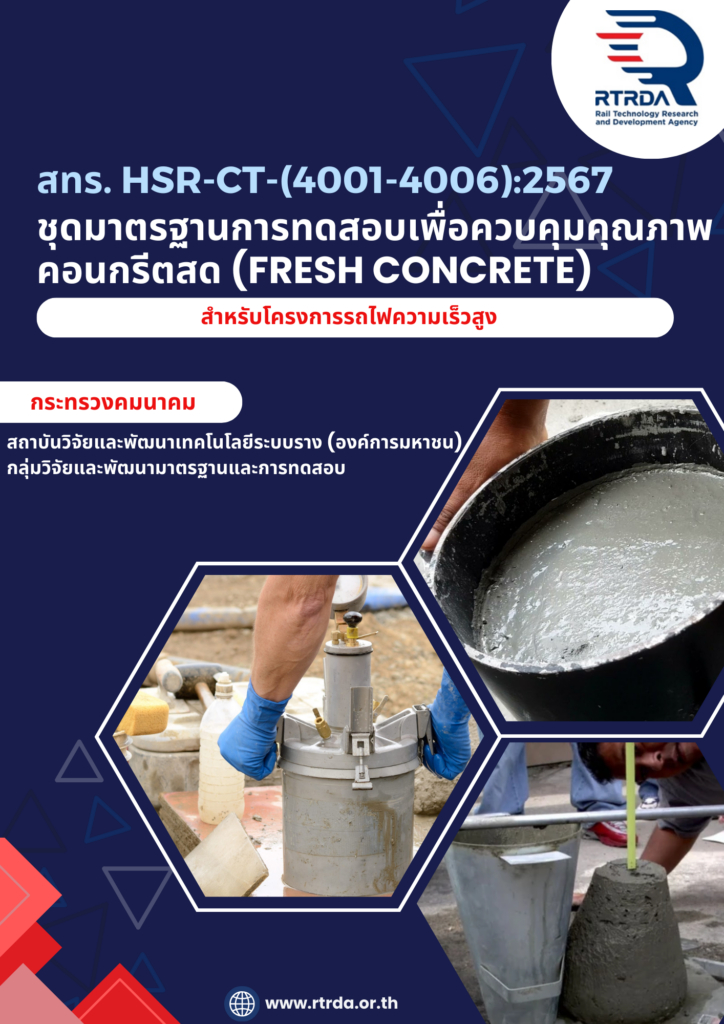 สทร. HSR-CT-(4001-4006):2567
สทร. HSR-CT-(4001-4006):2567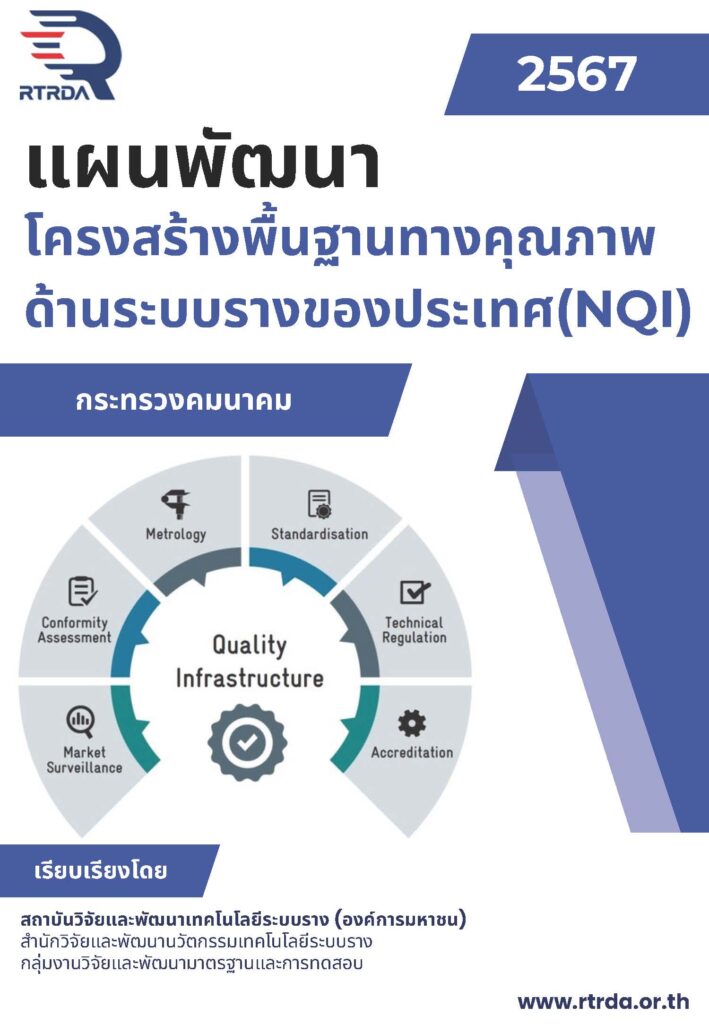 รายงานแผนพัฒนาโครงสร้างพื้นฐานทางคุณภาพด้านระบบรางของประเทศ(NQI)
รายงานแผนพัฒนาโครงสร้างพื้นฐานทางคุณภาพด้านระบบรางของประเทศ(NQI)